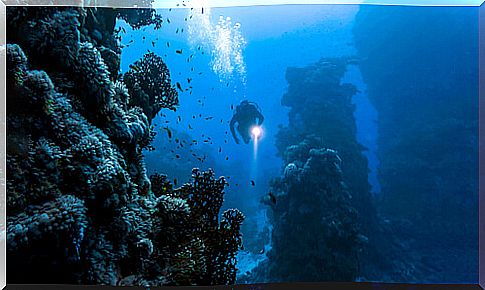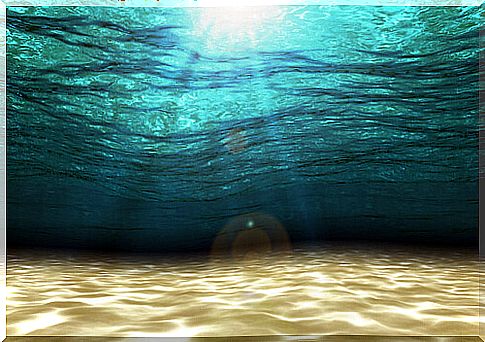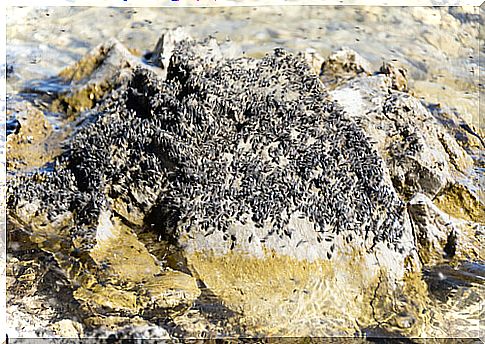Do Marine Insects Exist?

In recent years science has been surprised by the unexpected discovery of various aquatic insects. However, almost all the identified species live partially or totally in freshwater bodies. Therefore, the question still persists as to whether or not there are marine insects, adapted to waters with high salinity.
Next, we are going to learn a little more about aquatic insects and we will tell you if there are marine insects on our planet.
What are aquatic insects like?
All those species of insects that develop totally or partially in aquatic ecosystems are called aquatic insects. That is, they live throughout their life or in some specific stages of their life cycle in the different types of water bodies.
At present it is estimated that known aquatic insects represent 3 to 5% of all species of insects that inhabit the planet. Despite the small relative percentage, scientists have already been able to recognize more than 10 orders that comprise numerous species of aquatic insects.
Although they present an important morphological and habit diversity, all aquatic insects have been generated from terrestrial ancestors. Thanks to some adaptive evolutions in their anatomy and physiology, these species have managed to adapt their bodies to aquatic ecosystems.
Many species of aquatic insects can live their entire lives underwater. However, a part of the known species develops its larval stage in aquatic ecosystems. Some of them represent a serious public health alert, such as mosquitoes.
How have insects survived in the water?
As we have mentioned, aquatic insects have evolved from terrestrial ancestors, which were not prepared to survive in water. Therefore, living in aquatic ecosystems has required profound changes at the anatomical, physiological and behavioral level.

The most fundamental change has occurred in their respiratory system, as terrestrial insects are prepared to obtain oxygen from the air. But living in water, logically, requires the ability to capture oxygen and oxygenate your cells in an aquatic environment.
At present , aquatic insects are known that manage to capture the dissolved oxygen in the water. These species have developed tracheal gills, which give rise to a kind of branching with several tracheae.
However, there are also species that need to go to the surface to absorb oxygen directly from the air. Perhaps these could be the most primitive species, since they are not yet capable of living completely submerged and depend on the terrestrial environment to breathe.
In both cases, it is common to observe the presence of a plastron composed of several hydrophobic spines. These spines are located around the spiracles, which are small external holes known as ‘vents’. Together, they give rise to a respiratory system that acts like a gill.
Are there marine insects or not?
Now we know how it has been possible for insects to adapt to living in aquatic environments. But we still have to answer whether or not marine insects exist on our planet.
The vast majority of aquatic insects live only in freshwater bodies. However, there are some families that have managed to adapt to waters with high salinity: they mainly inhabit the marine coasts.

An example is the species Ephydra hians , which lives in waters with very high concentrations of salts from the Dead Sea . Popularly, it is known as the ‘alkaline fly’ and can be considered living proof that marine insects exist.
Why aren’t there more insects in the sea?
As we know, insects can reproduce very easily and demonstrate an incredible ability to adapt to different ecosystems. In this way, it is logical that we wonder why there are so few insects in the sea.
Unfortunately, there is still no consensus to explain this phenomenon. But many scientists suggest that this is because the seas represent a very inhospitable environment for insects.
Considering the great variety of animals adapted to marine life, insects would have an enormous number of predators. In addition, they would have to fight for territory with other species that were previously adapted to this environment, which would be a clear disadvantage.
It should also be noted that breathing in salt water requires a huge evolutionary adaptation of the respiratory system. If we observe the complexity of the organism of marine fish and crustaceans, we understand that the adaptation of terrestrial beings to marine life requires profound changes in their anatomy and physiology.
It is estimated that these would be the main reasons why the vast majority of aquatic insects inhabit fresh waters, and hence there are very few known marine insects on our planet.









